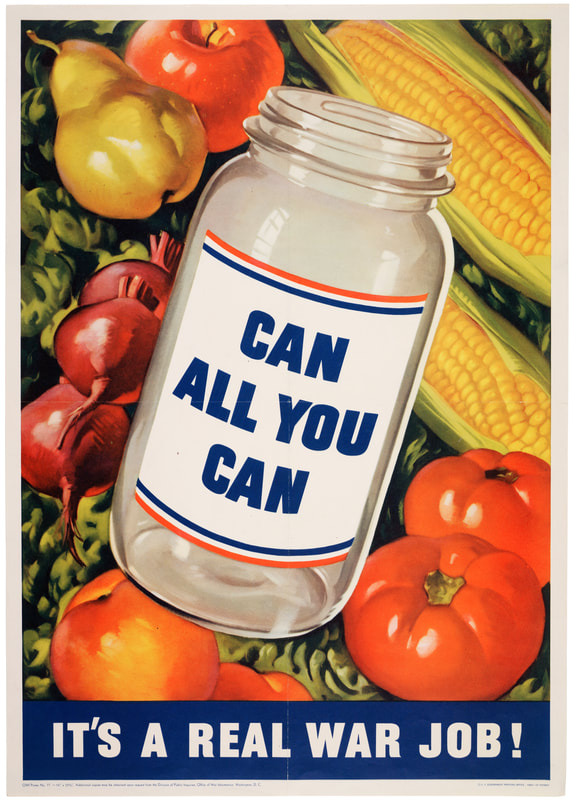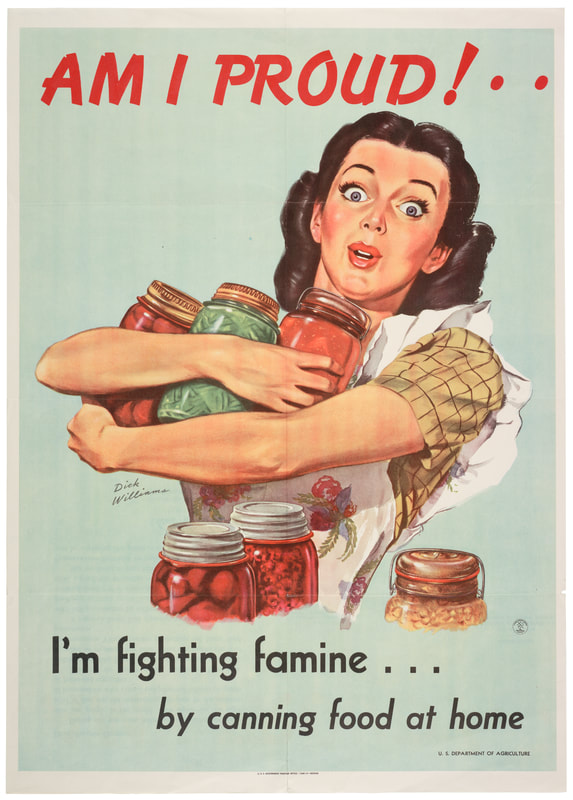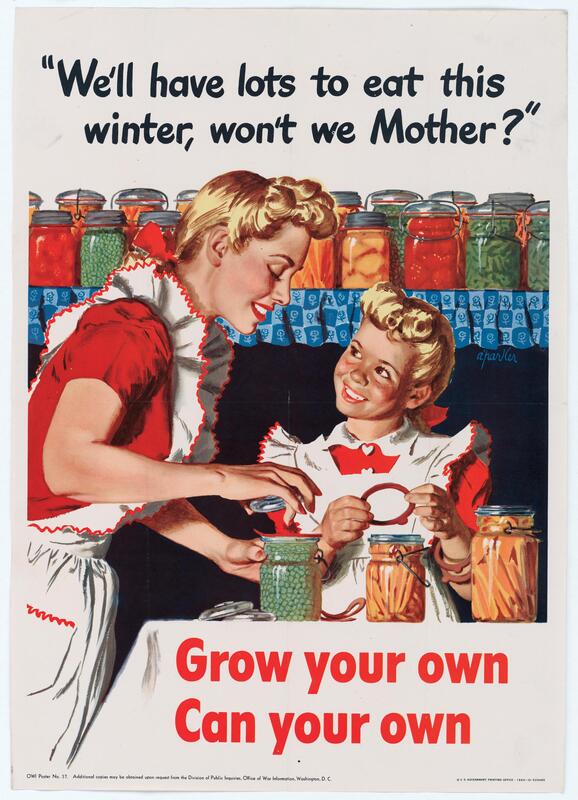|
Remember last week's foray into home canning during the First World War? Victory garden and canning efforts returned for World War II. Unlike the First World War, rationing during the Second World War was mandatory and regulated by the Federal government. Because purchased foods were restricted, Americans were strongly encouraged to keep victory gardens. And because commercially canned goods were needed for shipment overseas, ordinary people were encouraged to preserve the fruits of their victory gardens at home. Propaganda posters like the one above made great efforts to frame the drudgery of home food preservation in wartime terms. Housewives were encouraged to "can all you can," while the poster cheerily chirped, "It's a real war job!" presumably to put the kibosh on all the naysayers who insisted otherwise. In addition to being a "real war job," canning efforts were framed in a number of ways. In the above poster, a proud housewife, with perfect victory curls, a ruffly floral apron, and an armful of jars (beets, green beans, and tomatoes from the looks of it, with more beets, raspberries, and corn below) indicates that not only is she preserving food for her own family, she's also "fighting famine." By "canning food at home," she's freeing up commercially canned goods to be sent overseas to help the civilians of war-torn countries stave off famine. In this final poster, a cherubic little girl, in a dress and frilly apron that matches her mother's outfit, helps place the rubber rings on wire bail jars of carrots and peas, preparing them for canning. Hopefully in a pressure canner, since low-acid vegetables like peas and carrots need to be canned at higher than 212 degrees Fahrenheit (boiling point) in order to be safe from botulism. The girl says, "We'll have lots to eat this winter, won't we Mother?" implying that a well-stocked home pantry like the one in the background provided security against future food shortages or tightened rations. Both the promotion of home canning and the implementation of wartime rationing reflected an agricultural system not designed to provide massive surpluses. Coming out of the Dust Bowl era of the Great Depression, agricultural practices in the United States had improved, but most of the food produced at home was still consumed at home. Cuts had to be made domestically in order to free up the food supply for shipment overseas. In the decades since the Second World War, American agriculture has been transformed, both by the leftovers of chemical warfare and explosives production (pesticides and chemical fertilizers come to mind) but also by the mindset that producing unlimited food brings global security. Improvements to global shipping have meant that it is now as easy (or easier, and certainly cheaper) to get garlic from China as it is from the farmer down the street. Or apples from New Zealand or Peru than from a local orchard. Home preservation and home kitchen gardens are certainly no longer necessary, given the world of food at our fingertips at both grocery stores and online. With home food preservation no longer necessary, canning and gardening have taken on a sheen of delight. For many people, it is preferable to can your own jam from berries you picked yourself, rather than buy from the store. But I think the romance that hangs around home food preservation today belies the struggles of the past - when poorly preserved foods or inadequate supplies meant illness and hunger. When a poor harvest didn't just mean higher prices at the grocery store, but threatened real starvation. it's important to remember that food preservation during World War II played an important role in both nutrition and improving the everyday diet of Americans. But it's also important to recognize the amount of labor spent on both victory gardens and home canning at a time when American labor was already stretched thin in the war effort as factories ramped up production and speed, women took on the work of fighting men, and everyone hustled to get things done with fewer people and fewer resources. The size of the United States meant that we never quite had the same threats of deprivation as the U.K., which is perhaps why they are so much better at telling their WWII home front stories than Americans are. The size and scope of our continent meant we could be self-sustaining and still provide food abroad, whereas the United Kingdom had to learn how to do without regular food shipments to its tiny island. So the next time you do some home canning, whether from necessity or for fun, I hope you remember the people of the past. If you enjoyed this installment of #WorldWarWednesdays, consider becoming a Food Historian patron on Patreon! Members get access to patrons-only content, to vote for new blog post and podcast topics, get access to my food library, research advice, and more!
1 Comment
1/21/2023 07:59:25 pm
I found it interesting when you said that the government provides proper rationing to the people. My cousin who is a teacher mentioned a couple of days ago that he was looking for a non-profit organization about civil war history preservation that could help tackle the architecture, culture, and history of war. I'm thankful for this helpful article, I'll tell him he should check the revolutionary war tours as they can provide more information.
Reply
Your comment will be posted after it is approved.
Leave a Reply. |
AuthorSarah Wassberg Johnson has an MA in Public History from the University at Albany and studies early 20th century food history. Archives
July 2024
Categories
All
|




 RSS Feed
RSS Feed